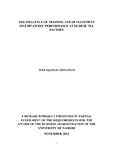| dc.description.abstract | Influence of training and development on employee performance at Mudete Tea Factory
is topical area of research in this study. Human resource management concerns itself with
recruitment, selection, placement, training, compensation, and industrial relations among
others. In this study training has been isolated and it has been explored in terms of its
effects on employee performance and satisfaction. Training has been defined as learning
activity directed towards the acquisition of specific knowledge and skills for the purpose
of an occupation or task. On the other hand organizational performance is a collection of
work activities, efficiency, effectiveness and tardiness at work; their measurement and
subsequent outcome of the work activities; while job satisfaction is defined as
employee’s affective reactions to a job, based on comparing desired outcomes with
actual outcomes The objective of the study is to establish the extent to which training and
development influences employee performance and commitment at Mudete Tea Factory.
This was a descriptive survey. The samples of 210 respondents were selected using
stratified random sampling technique. The study used primary and secondary data. The
collection instrument was a questionnaire which was both structured and unstructured.
The data collected was both quantitative and qualitative in nature. The data was analyzed
using basic descriptive statistics. This involved coding the information about specific
characteristics or attributes and using descriptive statistics like frequency distributions,
measures of central tendency, mean, median, and mode. Inferential statics such as
regression analysis was used to help predict variable from other variables.
The employees felt that the formal programme of employee training should not target
mostly new employees and those in the administration department but the majority. A
majority of the employees indicated that they had interest in further training specifically
in Information Technology. This could be attributed to the fact that technology changes
faster and production techniques need to be continually up dated to keep pace with other
producers and processors of tea. The employees felt that training programme has not been
quantified and the monetary value not established; the focus of training is on- job
specifically the need to have efficiency and safety in the orientation and operations of
machinery and equipment and effective sales. The respondents however felt the need to
streamline the training and development to cover all employees and functional
departments of the factory.
There is a weak link between employee training and satisfaction. This could be due to
diversified nature of the concept of employees’ satisfaction that includes aspects like
remuneration and work conditions. The research reveals that there is need for the
organization to formalize its training programmes and make it all round; because an
organization’s decision whether or not to train its workers affects the overall economy,
even if the firm does not factor the economy into its decision. Hence, training workers is
a type of a public good, a practice that encompasses abroad range of social dilemmas.
It is difficult for organizations to measure employee contribution without the quantitative
aspect of finance or better still without the use of scorecard. | en |

